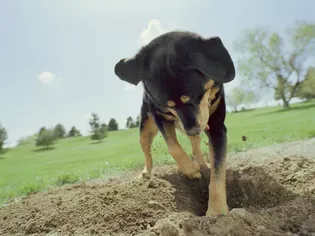All About Puppy Digging
Updated on 05/26/24

All About Puppy Digging: Digging Deep into Your Pup's Excavation Habits
Introduction: Unleashing the Secrets of Canine Excavation
Welcome to the subterranean world of puppy digging, where our adorable companions transform into mini excavators, leaving trails of dirt and destruction in their wake. While this behavior can be endearing, it can also be a headache for pet owners. But fear not! This comprehensive guide will delve into the depths of puppy digging, exploring its causes, consequences, and effective solutions.
Chapter 1: The Root of the Dig
Just like human children, puppies engage in digging for various reasons. Identifying the underlying cause is crucial for addressing the behavior effectively.
* Boredom or Lack of Exercise: Puppies are energetic creatures. When they don't have enough physical activity or mental stimulation, they may resort to digging as a way to release pent-up energy.
* Instinctual Behavior: Dogs are natural diggers. In the wild, they dig dens for shelter, to bury prey, and to mark territory. Some breeds, such as terriers and beagles, have a particularly strong digging instinct.
* Anxiety or Stress: Just like people, puppies can experience anxiety or stress. Digging can provide a sense of comfort and release for anxious pups.
* Environmental Factors: Certain factors in the environment, such as loose soil or buried objects, can trigger digging behavior in puppies.
Chapter 2: The Digging Dilemmas
While digging can be a natural behavior for puppies, it can also lead to a range of problems:
* Lawn Damage: Digging holes can ruin your lawn, creating unsightly patches and bare spots.
* Property Destruction: Puppies may dig under fences or gates, causing damage to property or even allowing them to escape.
* Health Hazards: Digging in contaminated soil or ingesting foreign objects can pose health risks to puppies.
Chapter 3: Digging Solutions: From Deterrents to Alternatives
Now that we've explored the causes and consequences of puppy digging, let's dive into the solutions.
* Redirect with Exercise and Play: Ensure your puppy receives plenty of exercise and mental stimulation. Regular walks, playtime, and training sessions can help redirect their digging energy into positive activities.
* Establish Designated Digging Areas: If you don't mind your puppy digging, consider creating a specific area in your yard where they can do so. Bury treats or toys in the designated area to encourage digging in the right place.
* Use Physical Deterrents: Sprinkle cayenne pepper or orange peels around plants or areas you want to protect from digging. These scents are unpleasant to dogs and can act as deterrents.
* Install Dig Barriers: Place buried chicken wire or other barriers under the ground to discourage digging in certain areas.
* Provide Enrichment Activities: Keep your puppy entertained with interactive toys, chews, and puzzle feeders. This can help reduce boredom and prevent them from turning to digging as a form of entertainment.
Chapter 4: Addressing Underlying Issues
If your puppy's digging behavior persists despite implementing these solutions, it may be a sign of an underlying issue.
* Rule Out Medical Problems: In rare cases, excessive digging can be a symptom of a medical condition, such as obsessive-compulsive disorder or cognitive dysfunction. Consult with your veterinarian to rule out any underlying health problems.
* Address Anxiety or Stress: If you suspect your puppy's digging is driven by anxiety or stress, work with a certified dog trainer or animal behaviorist to develop coping mechanisms and provide a more calming environment.
Chapter 5: Training Techniques to Curb Digging
In addition to the above strategies, consistent training can help discourage digging behavior:
* Positive Reinforcement: Reward your puppy for not digging in inappropriate areas. Offer treats or praise when they behave appropriately.
* Time-Outs: If you catch your puppy digging in the wrong spot, remove them from the area immediately and place them in a quiet, separate room for a brief time-out.
* Interruption and Redirection: When you see your puppy starting to dig, interrupt them with a loud noise or clap. Then, immediately redirect them to a designated digging area or engage them in an alternative activity.
Conclusion: Transforming Digging Challenges into Pawsitive Progress
Puppy digging is a common behavior that can be both endearing and problematic. By understanding the underlying causes, implementing effective solutions, addressing underlying issues, and implementing consistent training techniques, you can help your puppy channel their digging energy into more positive and acceptable behaviors. Remember, patience, consistency, and a healthy dose of understanding are key to transforming digging challenges into pawsitive progress.
Explore More Pets

Basic Training
Puppy and Baby Introductions

Working Dog Breeds
All About Search and Rescue Dogs

Dog Treatments
Puppy Vaginitis: Signs, Causes and Treatment

Dog Adoption
After More Than 1,200 Days in the Shelter, Coco Goes Home

Basic Training
How to Train Your Puppy to Go on Potty Pads

Hybrid Dog Breeds
The Difference Between a Mutt, Mixed Breed, or Designer Dog?

Dog Treatments
Nail Problems in Dogs

Puppies
7 Reasons Why Two Dogs Are Better Than One
